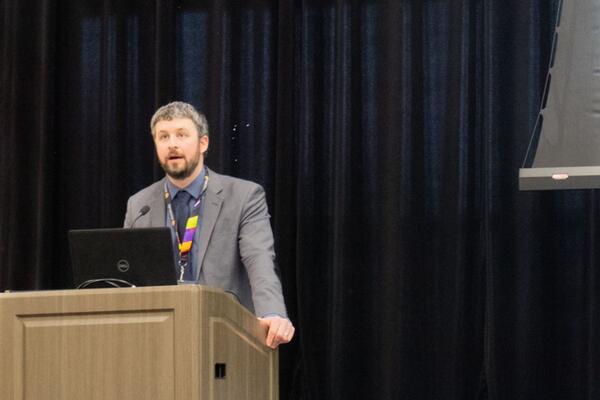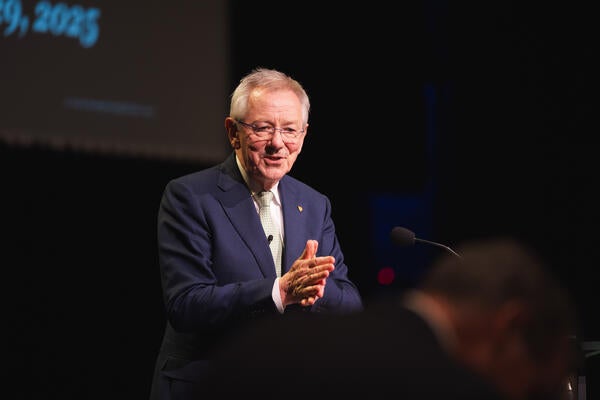
22 per cent of Waterloo departments now Green Office certified
10th annual Eco Summit celebrates major achievements in the 2023 Environmental Sustainability Report

10th annual Eco Summit celebrates major achievements in the 2023 Environmental Sustainability Report
By Darren McAlmont University RelationsWaterloo’s Sustainability Office hosted its tenth-annual Eco Summit on November 22, 2023, to showcase sustainability achievements, celebrate progress and build connections with our campus community.
The summit focused on how we can — and must — continue to accelerate sustainability action in our teaching and research activities. Action is also required in how we operate our campus, and in the ways we engage with one another as departments and individuals.
In his opening remarks, Vivek Goel, president and vice-chancellor, underscored the devastation that many climate events continue to cause across every continent on the planet. “These events will not stop on their own. Not unless we collectively take action to make it better, and to support those who will be disproportionately harmed by the impacts that are already locked in,” he said. “As a community of curious, collaborative, innovative and entrepreneurial problem-solvers and leaders, we have an opportunity to make a difference.”
Reflecting on the evolution of sustainability on campus over the last decade, similar sentiments were echoed by Mat Thijssen, director of sustainability, who explained “Our annual Eco Summit is an important opportunity to reflect on the sustainability efforts we have taken as an institution over the past year, to recognize the successes we have had and to catalyze further action.”

Thijssen provided a summary of the key facts in the 2023 Environmental Sustainability Report and emphasized that sustainability considerations will increasingly shape many decisions across society. “As an institution with key strengths in innovation and experiential learning, as well as deep roots in environmental education, Waterloo can be a significant part of our local and global transitions,” he said. “Eco Summit is one opportunity to come together and accelerate that progress on campus.”
The event featured two panel discussions, the first of which was moderated by Francesca Girmenia, communications and outreach assistant in the Sustainability Office, and explored the various ways students are pushing sustainability forward. The panel consisted of third and fourth-year undergraduate students Jason Amri, co-founder of 3cycle, Celine Isimbi, co-founder, Climate Justice Ecosystem, Maya Morton Ninomiya, undergraduate representative, Curriculum Integration Working Group and Evan VanderMeer, Indigenous entrepreneurship coordinator, United College.

Panelists from left to right: Jason Amri, co-founder of 3cycle, Maya Morton Ninomiya, undergraduate representative, Curriculum Integration Working Group, Celine Isimbi, co-founder, Climate Justice Ecosystem and Evan VanderMeer, Indigenous entrepreneurship coordinator, United College.
Speaking to the diverse range of students in the room, Amri encouraged them not to shy away from getting involved in or launching their own sustainability projects. “Being a student is one of the best points in your life to take risks, to try something new and to try and make an impact,” he said. “Once you're out of undergrad, you're sort of considered being a ‘real adult’ and the stakes get higher, with fewer chances to make mistakes.”
Isimbi echoed those sentiments when she spoke of the many initiatives that were made possible by students coming together around issues they were passionate about. She emphasized that the Climate Justice Ecosystem of which she is a co-founder was forged by having conversations with fellow undergraduate students who care about building a sustainable and resilient Waterloo campus for everyone. “On this campus, we have a long history of students organizing initiatives and programs they were passionate about. Let's build up our power and make sure that this particular issue [sustainable futurity] is a test,” she said.
In the second panel discussion moderated by Jacinda Reitsma, vice-president, Administration and Finance, the dialogue focused on how sustainability is being integrated into departmental operations. The panel featured David Ha, co-director, School of Accounting and Finance, Patricia Huỳnh, sustainability projects manager, Sustainability Office and Rob Hunsperger, senior director, Plant Operations.

Panelists from left to right: Patricia Huỳnh, sustainability projects manager, Sustainability Office, Rob Hunsperger, senior director, Plant Operations and David Ha, co-director, School of Accounting and Finance.
Hunsperger opened the conversation by reflecting on the sustainability changes he’s noticed across campus over the years and recalled how sustainability was usually an “add-on” to projects since the primary objective was to make things just slightly better than ‘code minimum’ and stick within the budget. However, he pointed out that over the last five to six years, there has been greater community understanding of the importance of sustainability.
“I'm finding increasingly there's a lot more understanding that sustainability is intrinsic in a project, and it's not something that can sort of be bolted on afterwards,” he said. “From a campus culture perspective, I think things are moving in the right direction and we're also seeing a lot of excitement about this within Plant Operations.”

When asked about a particular project she’s excited about, Huỳnh first remarked that the Sustainability Office wasn’t around when she first joined the campus community as graduate student in 2013. She then spoke of the Free Store that was launched earlier this year with the aim of diverting waste and making sure that we’re moving towards a circular economy.
“The Free Store is where if you no longer need something, it can be upcycled and someone else can take it. It's allowed us to divert a lot of waste,” she highlighted. “Campus Housing has also done a fantastic job at collecting useful materials students leave behind at the end of each term if they are moving away or graduating and we’re gladly repurposing it.”
The event concluded with awards given out in the following categories: Green Office, Green Labs, Green Residence and Living Planet Leader.
Waterloo’s Sustainable Futures Initiative aims to make the University a global leader in sustainability research, education and innovation to benefit the environment, economy and society. The 2023 Environmental Sustainability Report includes case studies, key statistics and evaluation of progress towards established objectives. As of 2023, 20 out of 27 objectives have been completed or are mostly complete, and the remaining seven are in progress and on their way to completion.

Read more
An ambitious research collaboration with Habitat for Humanity is reimagining home ownership across Waterloo Region and Canada

Read more
Researchers awarded funding to investigate ecology, climate change, repatriation, health and well-being through cultural and historical lens

Read more
TD Walter Bean Professor in the Environment, Sir Andrew Steer, shared powerful insights on how leaders, innovators, and communities can scale solutions for a more sustainable future
The University of Waterloo acknowledges that much of our work takes place on the traditional territory of the Neutral, Anishinaabeg, and Haudenosaunee peoples. Our main campus is situated on the Haldimand Tract, the land granted to the Six Nations that includes six miles on each side of the Grand River. Our active work toward reconciliation takes place across our campuses through research, learning, teaching, and community building, and is co-ordinated within the Office of Indigenous Relations.